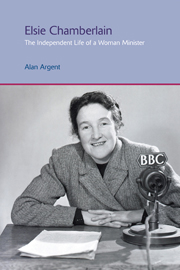Book contents
- Frontmatter
- Dedication
- Contents
- List of Illustrations
- Acknowledgements
- 1 Introduction and Early Life
- 2 The Call to the Ministry
- 3 Elsie Begins Her Ministry, 1939
- 4 The Return to London, 1941
- 5 Flying into the Storms: Chaplain in the Royal Air Force, 1945
- 6 A Season of Clear Shining: Married Life
- 7 Vineyard Congregational Church, Richmond-upon-Thames
- 8 Later Years at Vineyard
- 9 International Meetings and the CUEW Chair
- 10 Elsie at the BBC
- 11 After the BBC: The City Temple
- 12 The Sky Turns Black: Another Crisis
- 13 Sometimes a Light Surprises: The Congregational Federation
- 14 Hutton Free Church, 1971
- 15 A Local Thunderstorm: The Kentish Town Situation
- 16 Presidential Duties and Travelling, 1973–1980
- 17 Going West, 1980
- 18 Ministry in Nottingham, 1984–1991
- 19 Epilogue
- Bibliography
- Index
4 - The Return to London, 1941
- Frontmatter
- Dedication
- Contents
- List of Illustrations
- Acknowledgements
- 1 Introduction and Early Life
- 2 The Call to the Ministry
- 3 Elsie Begins Her Ministry, 1939
- 4 The Return to London, 1941
- 5 Flying into the Storms: Chaplain in the Royal Air Force, 1945
- 6 A Season of Clear Shining: Married Life
- 7 Vineyard Congregational Church, Richmond-upon-Thames
- 8 Later Years at Vineyard
- 9 International Meetings and the CUEW Chair
- 10 Elsie at the BBC
- 11 After the BBC: The City Temple
- 12 The Sky Turns Black: Another Crisis
- 13 Sometimes a Light Surprises: The Congregational Federation
- 14 Hutton Free Church, 1971
- 15 A Local Thunderstorm: The Kentish Town Situation
- 16 Presidential Duties and Travelling, 1973–1980
- 17 Going West, 1980
- 18 Ministry in Nottingham, 1984–1991
- 19 Epilogue
- Bibliography
- Index
Summary
Elsie was impatient to be the minister of her own church. She may have entertained hopes that a return to London might enable her on-off romance with John Garrington to be rekindled. Three months after her appearance at the May assembly of the Congregational Union of England and Wales, on 17 August 1941, Elsie Chamberlain preached at Christ Church Congregational Church, Friern Barnet, in north London. The church there had been looking for a minister since its former pastor, Herbert Cecil Pugh (1898–1941), had left to join the RAF as a chaplain in October 1939, one month after the outbreak of war. Pugh had trained at Mansfield College, Oxford (1920–1924) and, after a brief ministry at Camberley, had served as Christ Church's minister since 1927. On 5 July 1941 Pugh was on board a ship, carrying over 1,300 passengers, bound for West Africa, when it was torpedoed in the Atlantic. He learned that several injured airmen were trapped in the damaged hold and, dismissing all protests, insisted that he should be allowed to join them, although he understood that to do so meant his certain death. By acting thus, he disregarded his own safety, believing that his duty as a minister was to be with his men and, ‘in the best tradition of the service and of a Christian minister, he gave up his life for others’. In 1947 Pugh was posthumously awarded the George Cross. His death occurred, therefore, only six weeks before Elsie came to preach at Christ Church.
- Type
- Chapter
- Information
- Elsie ChamberlainThe Independent Life of a Woman Minister, pp. 40 - 52Publisher: Acumen PublishingPrint publication year: 2012



